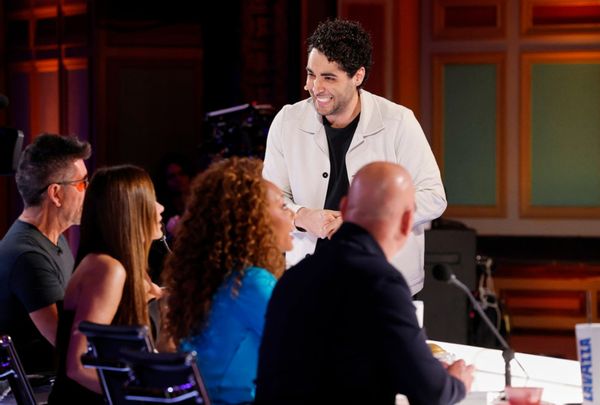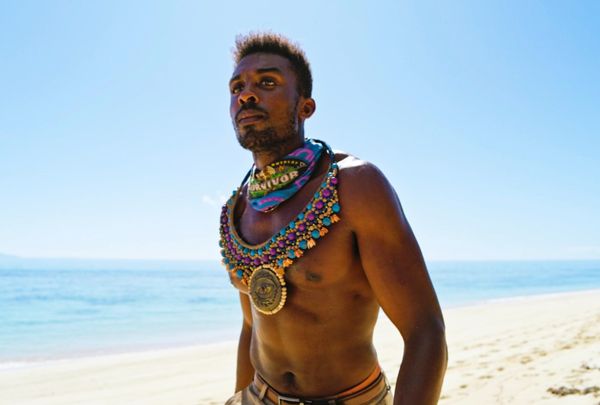How "Survivor" and "America's Got Talent" sell the lie that is the American Dream

Anyone would be nervous to open an “America’s Got Talent” audition episode. Eric Booker sure seemed to be on Tuesday's landmark 20th season premiere. The former New York City subway conductor smiled timidly, shifting his weight from one foot to the other as he explained to lead judge Simon Cowell that retirement gave him more time to work on his talent.
“Well, Eric, you’ve got two, three minutes, as we always say, to change your life,” Cowell said, signaling Booker’s audition to commence. Alas, his talent is not worth quitting his day job. In quick succession, he downed large jars of pickle juice, hot dog water, creamed corn and hot sauce. Cowell deemed this acid reflux extravaganza to be “small.”
But Booker, like every other “America’s Got Talent” contestant, referred to his chug ability as his dream. That word came up many times during the show’s first audition rounds as dancers, singers, magicians, acrobats and a contortionist took the stage.
“What's the big dream, seriously?” Cowell asks the leader of a breakdance crew, who answers that he wants to perform on the biggest stages.
To Light Wire, an “immersive art creative content company” from Brazil, the “dream” involves blending computer graphics technology with a choreographed live performance. Zak Mirz, a magician, tells the judges that having his moment onstage is the dream. “I was walking out of the hotel room today, and I was thinking to myself, ‘Wow, since I was like seven or eight, I’ve wanted to do this,’” he says. “And now it's just so incredible to see y'all.”
 Simon Cowell, Sofia Vergara, Mel B, Zak Mirz and Howie Mandel on "America's Got Talent" (Trae Patton/NBC)No consideration of reality TV is complete without acknowledging the impact of “Survivor,” which hits its 25th anniversary milestone today; its first episode aired May 31, 2000 on CBS. “Survivor” was not the first reality series, but it ushered in a version of the genre that we can accurately describe as world-changing. “Survivor” begat “The Apprentice,” sharing an executive producer in Mark Burnett. And “The Apprentice,” as we know, begat a president whose qualifications and business acumen were outrageously oversold on that show.
Simon Cowell, Sofia Vergara, Mel B, Zak Mirz and Howie Mandel on "America's Got Talent" (Trae Patton/NBC)No consideration of reality TV is complete without acknowledging the impact of “Survivor,” which hits its 25th anniversary milestone today; its first episode aired May 31, 2000 on CBS. “Survivor” was not the first reality series, but it ushered in a version of the genre that we can accurately describe as world-changing. “Survivor” begat “The Apprentice,” sharing an executive producer in Mark Burnett. And “The Apprentice,” as we know, begat a president whose qualifications and business acumen were outrageously oversold on that show.
To Eunji Kim, an assistant professor of political science at Columbia University, neither of those shows has as potent an impact on our culture as the variety made-for-TV dream weaving that “America’s Got Talent” trades in. “Survivor” does sell us a type of American story, Kim said in our recent Zoom conversation. But entertainment entwined with tales of upward mobility and determination, she said, holds the power to distort our view of who deserves wealth and success.
“What we choose to watch matters a lot for our perceptions — more than we think,” Kim told me in a recent conversation over Zoom. “I think a lot of people have a hard time believing that the frivolous, ‘whatever’ content they're watching is potentially affecting their fundamental beliefs about American politics.”
In Kim’s recently released book “The American Mirage: How Reality TV Upholds the Myth of Meritocracy,” she presents extensive research finding correlations between one’s tendency to believe in the bootstraps version of the American Dream and exposure to shows like “AGT,” “American Idol” and “Shark Tank.”
Kim defines these shows as “rags-to-riches” narratives, contests that equate a person’s capabilities and success with hard work and determination – what she describes as the American Dream, for the purpose of her research. They also have broad appeal across age and gender demographics.
“A lot of people have a hard time believing that the frivolous, ‘whatever’ content they're watching is potentially affecting their fundamental beliefs about American politics.”
Her conclusions may give a casual reality competition viewer pause. Between crunching ratings numbers and analyzing her own data drawn from surveys and field research, she found that shows like “AGT” may “amplify the belief that wealth is a reward of diligence, foster a tolerance for income inequality and kindle resistance to higher taxes among the affluent.”
“I wanted to raise awareness that when you're watching your favorite TV show on Friday night on your couch with a beer, you're entertaining yourself. You're not thinking about politics, per se,” she said, “but images that you're being exposed to fundamentally affect the way you think about our society, and we have to be a little bit more mindful of that.”
 Mitch Guerra and Kamilla Karthigesu on "Survivor" (CBS). Reality TV is a young form of entertainment compared to film and pulp literature, each of which shows correlating phenomena in history. Kim cites the rise of superhero comics in post-World War II America when consumers sought out escapism. In the early 20th century’s Gilded Age, the best-selling books weren’t the ones we consider classics, but Horatio Alger’s inspirational pulp. The shows fitting Kim’s “rags-to-riches” model align with this cultural tendency.
Mitch Guerra and Kamilla Karthigesu on "Survivor" (CBS). Reality TV is a young form of entertainment compared to film and pulp literature, each of which shows correlating phenomena in history. Kim cites the rise of superhero comics in post-World War II America when consumers sought out escapism. In the early 20th century’s Gilded Age, the best-selling books weren’t the ones we consider classics, but Horatio Alger’s inspirational pulp. The shows fitting Kim’s “rags-to-riches” model align with this cultural tendency.
While the first season of “Survivor” was a runaway hit, “American Idol” earned much higher ratings from its second season onward. Some credit for its audience expansion between the first and second seasons is due to scheduling; its inaugural contest took place in the summertime. Once Fox moved “Idol” to midseason, it became a juggernaut.
But some part of its cultural explosion had to do with mood. “Survivor” bowed for the first time before 9/11 and established itself as a Darwinian experiment with the motto “Outwit, Outplay, Outlast.” “American Idol” found its success in playing to its viewership’s aspirational desires, the American Dream catalyst that Kim finds essential in explaining our political attitudes.
“America’s Got Talent” contestants are competing for a $1 million cash prize, but as Cowell implies, competitors are urged to dream much bigger than that. Season 2 winner Terry Fator set the bar for what’s possible by scoring a five-year residency at the Mirage in Las Vegas worth a reported $100 million.
Eighteen seasons later, contestant narratives are central to the formula. Viewers need them because we’ll be seeing some of these acts compete many times over the summer. And the more we see the performers in action, the more we’ll get to know about them. A cursory Internet search reveals that Mirz is the child of immigrants from Iran and Pakistan. He has a great story.
The leader of the breakdancing crew Team Recycled explains that they support themselves by holding other jobs. “It's really hard to only live off of dancing,” he says. Their act is stunning. Their hungry determination helps their case.
Even so, doesn’t “Survivor” model another pervasive, broadly embraced version of the American dream as well? “Survivor is such a tricky TV show,” Kim admitted, explaining that the game doesn’t necessarily emphasize hard work. “But I do think that they promote a certain way of thinking that is very system-justifying. You're surviving, you're competing with others, and based on your innate skills, you can get ahead.”
I ran this past Andy Dehnart, whose site Reality Blurred is the oldest outlet dedicated to covering the genre seriously. Dehnart is a “Survivor” specialist (and, full disclosure, a good friend) known for covering the show from an episodic perspective as well as reporting on production and industry-related developments. He also spoke with Kim and appreciates her concise focus.
“We're far away from [Kim’s version of] rags-to-riches here,” he told me. “But it is rags-to-riches in the sense that every single ‘Survivor’ player is on the exact same place on the playing field on Day 1, and one of them will have $1 million on Day 26 or 39, depending on the season.”
“At the same time,” he continued, “that playing field that we think is the same and even on day one is, of course, not.”
 Kyle Fraser on "Survivor" (CBS)Dehnart cited a 2023 study titled “Surviving Racism and Sexism: What Votes in the Television Program Survivor Reveal About Discrimination” that found that over the first 40 seasons of “Survivor” people of color, and especially Black women, were more likely to be voted off immediately.
Kyle Fraser on "Survivor" (CBS)Dehnart cited a 2023 study titled “Surviving Racism and Sexism: What Votes in the Television Program Survivor Reveal About Discrimination” that found that over the first 40 seasons of “Survivor” people of color, and especially Black women, were more likely to be voted off immediately.
In 2020, CBS established a policy that its unscripted programs would feature casts with at least 50% Black, Indigenous and other non-white contestants, which came into play during the 2021-2022 season. The 41st winner of “Survivor,” Erika Casupanan, is the first Filipino and Southeast Asian to win the game. She’s also Canadian.
Only two Black women, Maryanne Oketch and Vecepia Towery, have ever won “Survivor.” On May 21, Kyle Fraser expanded the ranks of Black winners when he clinched the Sole Survivor title and the million-dollar prize. Part of his strategy was to refrain from revealing that he’s a highly paid lawyer, so as not to create the perception that he didn’t need the money.
“As our actual economic realities become much more insecure and income inequality is rising, I think that sense of heightened economic insecurity probably prompts people to seek more of this uplifting content."
Such maneuvering plays to Kim’s argument, in a psychological sense. Fraser exercised his talents to play the game well. Surely, some viewers see the wisdom in withholding that information and others resent Fraser’s deception. But does that choice make him less deserving of his winnings?
In “Survivor,” Dehnart reminded me, the main goal is for finalists to persuade a jury of their peers that they played the game the best. Hence, the beauty of the first season’s snake and rat speech and a subsequent vote awarding the top prize to Richard Hatch, one of the greatest villains in reality TV history.
Want a daily wrap-up of all the news and commentary Salon has to offer? Subscribe to our morning newsletter, Crash Course.
A person can understand, then, why shows fitting Kim’s “rags-to-riches” model are better at speaking to a more common and false view of America as a meritocracy. One of her findings was that people experiencing high economic insecurity are much more drawn to these shows. “American Idol” peaked in popularity during the 2008 financial crisis, she reminded me.
“As our actual economic realities become much more insecure and income inequality is rising, I think that sense of heightened economic insecurity probably prompts people to seek more of this uplifting content,” Kim said.
Is that a terrible thing? Of course not. As is the case with any show, enjoying “America’s Got Talent,” “Survivor,” or any reality series doesn’t make their fans morally bankrupt. In fact, Kim also found some evidence of their positive impact. In “American Mirage,” she cites empirical evidence suggesting a strong correlation between local “Shark Tank” viewership and queries at Small Business Administration centers.
Dehnart also cites “Shark Tank” separately, and unprompted, as an example of a false sales pitch promising the American Dream’s attainability. "'All you have to do is, you know, work hard and now you'll make millions on ‘Shark Tank.’ That’s a lie that they sell, because it's something that we as Americans like to believe, that we are individually capable of succeeding, and nothing can stop us.”
Kim agrees. “As a society, as a collective . . . it might have a conservative influence in our policy attitudes and how we think about who's deserving of help,” she said. “All ‘rags-to-riches’ TV shows prompt us to think that, well, if anyone can get ahead by working hard, then why bother helping the poor? Or, why should we increase tax rates on Elon Musk? He earned it. He's smart. He worked hard. He can do whatever he wants. So it has tricky normative implications, in my view.”
Enjoy the escapist refreshment, is what she's saying. But don't follow Booker's act — consume responsibly.
"America's Got Talent" airs at 8 p.m. Tuesdays and Wednesdays on NBC. "Survivor" returns to Wednesdays on CBS in the fall.
salon





